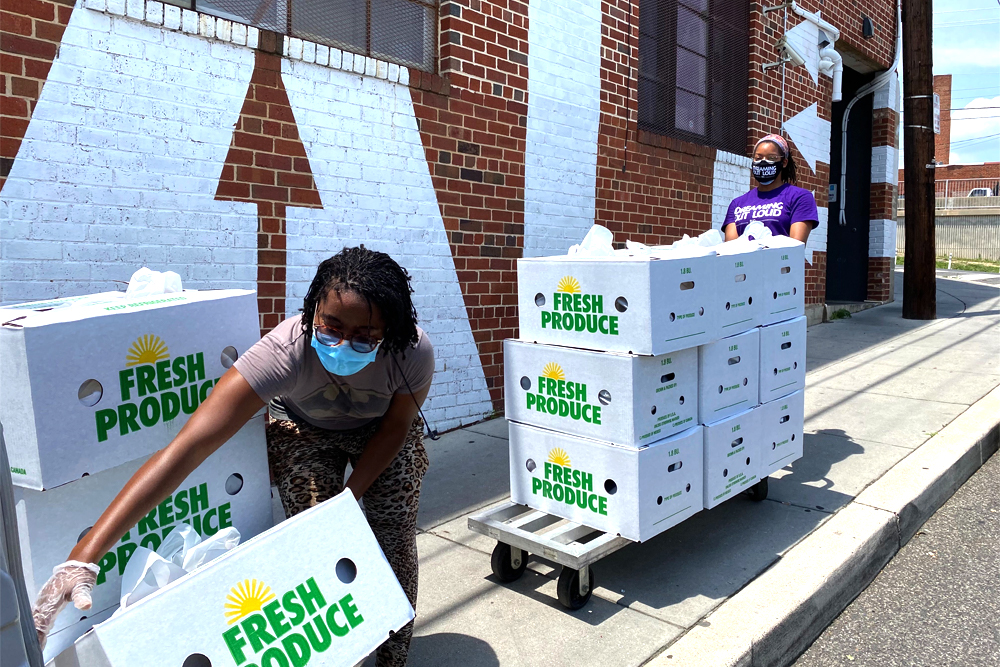Eat

The Path To Land Justice
July 10, 2020 @ 10:00am
Only 1.4 percent of farmers in America today – about 48,000 – are Black, according to the U.S. Department of Agriculture. Compared to the historical peak in 1920 when there were more than 925,000 Black farms, the current figure begs the question: What’s changed?
The answer doesn’t lie in trends or shifting demographics, but intentional, systematic efforts to push Black farmers off their land, starting from the moment Andrew Johnson took office and continuing through the civil rights era, the effects of which are still reverberating today.
“People don’t get the depth of what happened,” says Paula Johnson, the curator of food history at the National Museum of American History (NMAH). “In the civil rights era, to have this systematic discrimination both locally and at the federal government level, that resulted in the loss of a significant percentage of acreage is something that just doesn’t jive with people’s ideas about the civil rights movement.”
To understand the history of injustice surrounding land ownership, look back to the end of the Civil War. “You have many African Americans who were formerly enslaved and suddenly they have their freedom, but they weren’t given any tools whatsoever to deal with that freedom and make a living,” Johnson explains.
The phrase “40 acres and a mule” may be familiar – this refers to the 400,000 acres of confiscated confederate land set aside for newly freed African Americans. However, after Abraham Lincoln was assassinated, President Andrew Johnson reversed this order and that land was returned to its former owners.
“Owning a farm, being able to raise food, to accumulate wealth in that way, to have something to leave to your family – all of that is of tremendous value and empowerment,” NMAH’s Johnson says. “This idea of 40 acres and a mule, which seemed so promising to people, was just pulled out and it became a symbol for broken promises that of course continued into history.”
Against all odds, some Black farmers managed the challenging transition between sharecropping to tenancy and eventually to ownership, as Pete Daniel illustrates in his book Dispossession.
“Slaves emerged into freedom with a keen understanding of farming that allowed many to navigate the boundary between exploitation and sufficiency,” he writes. “A combination of husbandry, diplomacy and ambition allowed Black farmers to secure land, and the fact that so many succeeded during some of the darkest years of racist violence testifies to their character and determination.”
Black farmers owned approximately 16 million acres of farmland in 1910, but own about a quarter of that figure – 4.7 million acres – today.
In his book, Daniel lays out the findings from a March 1965 report by the U.S. Commission on Civil Rights.
“‘Equal Opportunity in Farm Programs: An Appraisal of Services Rendered by Agencies of the United States Department of Agriculture’ revealed that Blacks had no input in policy, had no representation on county agricultural committees, were refused loans and benefits, and suffered encompassing discrimination.”
“At the moment that civil rights laws promised an end to discrimination, tens of thousands of Black farmers lost their hold on the land, in part because of the impact of science and technology on rural life but also because they were denied loans, information and access to programs essential to survival in a capital-intensive farm structure,” he continues.
This is coupled with individual accounts of land theft by intimidation, violence and murder, some of which were laid out in an 18-month investigation by the Associated Press that documented 107 cases totaling more than 24,000 acres of land lost.
“With the history of this country, there has been an abusive relationship between Black people and land,” says Xavier Brown, founder of Soilful City, a D.C.-based organization he describes as dedicated to “reconnecting Black folks back to land and back to our agricultural roots.”
Soilful City is part of the Black Dirt Farm Collective, which is a member of the National Black Food and Justice Alliance (NBFJA). Organizations like these work to rectify decades of injustice through organizing, education, advocacy and action.
Brown has been growing food for the past seven years and says his involvement with collectives has been enlightening.
“There’s a political education process. You learn about the history of the country in a different way from your public school history,” he says. “When people talk about urban farming, it’s about starting a garden, teaching kids about kale, broccoli, all that type of stuff, but they completely skip over the political aspect of food and how the industrial food system right now is based off the plantation.”
Soilful’s work for the past four years has been to build support for Black growers, in part through the sale of a hot sauce called Pippin Sauce. The organization also puts an emphasis on regenerative economics. “I live in Southeast, so [I hire] youth from my neighborhood of Bellevue to work with me every summer and educate them on agriculture, small business and things of that nature,” he explains.
Dreaming Out Loud is also a member of the NBFJA, with multiple arms working toward racial justice and food access, including a food hub, a Black farm community supported agriculture (CSA) subscription with sliding scale pricing, an entrepreneurship training program and a 2-acre diversified urban farm at Kelly Miller Middle School in Northeast D.C.
“One of the core principles for us is really being able to provide meaningful employment for people within our communities,” says Dreaming Out Loud’s farm director, Violet King.
Another aspect of the organization’s work is advocacy to promote land access and support infrastructure-building.
“Black people don’t have access to land in the same way that white farmers do,” she says. “Land isn’t passed down through the generations. So maybe somebody’s grandparent or somebody’s great-grandparent was a farmer, but then if you lose that land, someone like me, I don’t have any family members who have land. So, it’s going to be much harder for me to start a farm business.”
“Then when they get the land, they don’t have the funds necessary to have the infrastructure that you need to have a full-fledged operation,” she continues. “I think people don’t realize how much goes into growing food, or into raising chickens or cattle, and how much capital you need up front.”
King says this lack of access to capital is due to a combination of the wealth gap and discriminatory or predatory loan practices by the USDA and private lenders.
In addition to the work they do through their organizations, both King and Brown say the only way to achieve true equity is through reparations.
“The wealth gap is so large, and because we have been redlined and unable to benefit from stuff that other people have been able to benefit from in this country, while our ancestors did a lot of work to build this agricultural system and build up the country, there doesn’t seem to be another way to rectify that,” King says.
Numerous agricultural organizations, like the Acres of Ancestry Initiative and Black Land and Power, have campaigns for reparations, and the proposed congressional bill H.R. 40 would establish a commission to study the concept. The bill has yet to be put to Congress for a vote; a reparations bill has been introduced in every Congress since 1989.
Brown believes that in addition to donating funds and volunteering time to organizations working toward land and food justice, taking time for education is one of the most important steps toward equity.
“Having dialogue with each other is important so people can understand what’s actually going on outside of the romanticized version of urban agriculture that’s promoted,” he says. “If you’re not educated on what’s going on, even if you’re well-meaning, you become a tool for the system and you end up replicating how you’ve been socialized.”
Learn more about Soilful City on Instagram @soilful and look out for their new website. Check out Dreaming Out Loud at www.dreamingoutloud.org or @doldc on Instagram.
Support Black Farmers
Dig deeper with these additional organizations dedicated to supporting Black farmers in the Mid-Atlantic and nationwide. All descriptions are courtesy of the organizations’ social media accounts or websites.
Acres of Ancestry Initiative/Black Agrarian Fund
“A self-sustaining collaboration to preserve our ancestors’ value paradigm anchored in collective land tenure, spirit-culture reclamation and ecological harmony.” www.acresofancestry.org
Black Church Food Security Network
“Utilizes an asset-based approach in organizing and linking the vast resources of historically African American congregations in rural and urban communities to advancing food and land sovereignty.”
www.blackchurchfoodsecurity.net
Black Dirt Farm Collective
“A collective of Black farmers, educators, scientists, agrarians, seed keepers, organizers and researchers guiding a political education process.” Follow on Instagram @b_d_f_c.
Black Land and Power
“Building a land-based movement for Black liberation [and] developing interdependent strategies that move us away from extractive economies dependent on the violent enclosure of land, labor, culture, power, wealth and spirit.” www.reparationssummer.com
Family Agriculture Resource Management Services (F.A.R.M.S.)
“A national nonprofit dedicated to reversing small farmland loss to ensure generational wealth and reducing hunger in rural low-income communities.” www.30000acres.org
The Federation of Southern Cooperatives
“A nonprofit cooperative association of Black farmers, landowners and cooperatives […] organized by state associations with field offices serving a primary membership base in the Southern states.” www.federation.coop
George Washington Carver Urban/Small Farmer’s Coalition, Inc.
“Building an organizational structure that is primarily focused on connecting underserved rural farmers/landowners with urban families and communities to address the food and economic disparities that exist within the service areas of our coalition.” www.gwc-usfc.org
National Black Farmers Association
“A nonprofit organization representing African American farmers and their families in the United States [and serving] tens of thousands of members nationwide.” www.nationalblackfarmersassociation.org
National Black Food and Justice Alliance
“A coalition of Black-led organizations working towards cultivating and advancing Black leadership, building Black self-determination, Black institution building and organizing for food sovereignty, land and justice.” www.blackfoodjustice.org
The Rural Coalition
“An alliance of farmers, farm workers, indigenous, migrant and working people from the United States, Mexico, Canada and beyond, working together toward a new society that values unity, hope, people and the land.” www.ruralco.org
Southeastern African American Farmers’ Organic Network
“A regional network for Black farmers committed to using ecologically sustainable practices to manage their land and the natural systems on it in order to grow food and raise livestock that are healthy for people and the planet.” www.saafon.org
Suggested Reading
Farming While Black: Soul Fire Farm’s Practical Guide to Liberation on the Land by Leah Penniman
Dispossession: Discrimination Against African American Farmers in the Age of Civil Rights by Pete Daniel
Freedom Farmers: Agricultural Resistance and the Black Freedom Movement by Monica M. White
Enjoy this piece? Consider becoming a member for access to our premium digital content and to get a monthly print edition delivered to your door. Support local journalism and start your membership today.







